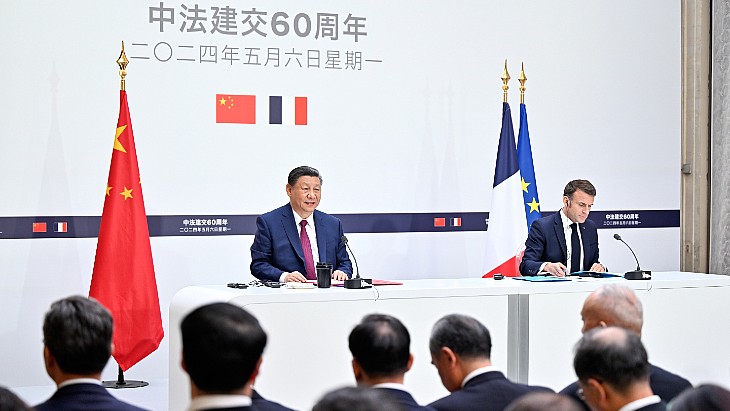Nuclear industry leaders discuss game-changing issues

"Working groups are our member forums, of which we are very proud," said Serge Gorlin, head of industry cooperation at World Nuclear Association, who moderated the event. "They come together regularly - lately through virtual means - and under different topic areas to share best practice, conduct analysis and develop consolidated positions. Several of these groups act as the interface for industry at standards and policy-setting organisations, such as the International Atomic Energy Agency." Progress in the areas under discussion by the working groups could "offer a step-change in the industry's fortunes".
Mike Pacilio, executive vice president and COO of US utility Exelon and a member of World Nuclear Association's board, gave an opening address to the webinar. He noted the "valuable work" the working groups perform "on behalf of all of us". The issues they work on are "slow-burners" and require a great commitment, he said, "but when they come to fruition, the rewards to the industry are immense".
Radiological protection
Discussing the issue of radiological protection, Marcel Lips of Swiss nuclear operator Kernkraftwerk Gösgen-Däniken and chair of the radiological protection working group, called for better education about radiation and its risks. "There has been a long-standing debate, which has evolved over decades from scientific and epidemiological data." He noted that while there is sound scientific evidence that excess cancer risk increases with increasing dose, such an effect cannot be demonstrated for lower doses.
"The use of the linear no-threshold (LNT) model is often misunderstood and leads to policymakers’ over-conservatism, this in turn leads to unnecessary confusion and fear among the general public, as well as unnecessary burden to the industry and its application of nuclear technologies," Lips said. "A misbalance of assumed risk and the silence-keeping on benefits may hinder the further development of these technologies." He added that education about radiation "would increase people's ability to better understand the risks and benefits and lower their dependencies on any misleading headlines."
On proposed changes to the units used for measuring dose, Josip Zic of McMasters University said: "If we are going to make substantial changes to dose quantities, we need to ensure they are justified by an improvement in safety for people and the environment." He said this is where input from members into the proposed changes is needed.
"It is quite a big step to overcome, to build trust and understanding [from the public], and in that perspective, the international recommendations and the guide documents are so important," said Arne Larsson of EDF radioactive metal recycling subsidiary Cyclife Sweden AB.
Used fuel and waste management
Gorlin noted that although the nuclear industry accounts for and manages all the radioactive waste it produces, the back-end of the nuclear fuel cycle is viewed externally "as presenting unsolved issues".
Cecile Evans of Orano said the industry has to acknowledge that the long-term management of used nuclear fuel and waste remains "a key issue affecting the acceptance of nuclear power". She said the responsible use of nuclear power requires "a credible solution, implemented in an orderly manner, for managing used fuel and waste".
However, the industry has developed for decades implemented and financed solutions, as well as infrastructure, to safely manage used nuclear fuel inventories in compliance with all the national and international regulations, Evans noted. "The absence of the deep geological disposal solution for high-level waste is not so much a technical issue but rather a political issue."
Larsson said governments and regulators have a very important role to play in providing a clear policy framework and regulations. The industry, with support from World Nuclear Association and others, has the task to "convert the rules, to guide instructions for implementation". He said the regulator and industry must then have dialogue with other stakeholders and society on the issues.
Mikhail Baryshnikov of Russian nuclear fuel cycle company Tenex noted there are many innovative solutions that could be implemented in the routine management of used fuel and radioactive waste. These innovations, he said, could "help answer the challenges the whole industry has".
Harmonised approaches to licensing reactors
"Nuclear reactors cannot be easily imported and exported," said Nawal Prinja of Jacobs and deputy chair of World Nuclear Association's working group on Cooperation in Reactor Design Evaluation and Licensing (CORDEL). "You can't design in one country and easily go and build it in another country." CORDEL, he said, "attempts to ease that process".
NuScale's Tom Bergman, also deputy chair of the CORDEL working group, said harmonisation is "the ability to have the same design in multiple countries, even though they are under different regulatory frameworks". He noted there will always be some "site-specific, regulator-specific aspects".
There has been great progress made in harmonisation, said Elina Teplinsky of Pillsbury Law. However, there are a number of significant barriers in some markets, the most important being established national legal and regulatory frameworks. Some countries have "entrenched regulatory approaches that have been very carefully crafted and tested over time", and there is also the issue of sovereignty and pride. The most important barrier, Teplinsky said, is established national legal and regulatory frameworks. "In many countries the law requires public participation in rulemakings. Often, even incremental changes to regulations engender some opposition." Different codes and standards used by regulators is a further barrier, as accepting new ones to be used in licensing is "definitely a challenge" for most regulators.
New applications
NuScale's Bergman noted that nuclear power plants, with some exceptions, have generally been regarded as providers of baseload electricity, primarily due to their size. However, interest is growing in the use of nuclear reactors for non-electricity applications, including hydrogen production, desalination, process heat and district heating.
There is a lot of activity in Canada regarding the deployment of small modular reactors (SMRs) for both on-grid and off-grid use, said Milt Caplan, president of MZ Consulting. "While the on-grid SMRs are rooted in the familiar - more traditional utilities having another option for electricity generation they can add to their grids - the off-grid use of SMRs, whether it's for electricity or electricity and heat, is really revolutionary in nature." He said SMRs offer the opportunity for the replacement in most cases of diesel generation.
Teplinsky said there has so far been a limited use of nuclear for the desalination of water and that there is still capacity to expand this application. For hydrogen production, she said there is still a lot of R&D required as well as commercial demonstration. "The market is potentially immense ... This could be a true gamechanger."
System costs
Gorlin said there is an "evolution taking place in the way we measure electricity costs". He said the growth of intermittent, non-dispatchable sources in the electricity system has led to the need to look at the system as a whole, rather than at a plant-level.
Caplan said this is a "big change in the way we look at the economics of electricity generation". He said with the introduction of more renewables into the electricity system, "the characteristics are very, very different and you cannot compare them on a one-on-one basis". The system costs approach is evolving, he noted, adding these can be substantial and rise as the amount of renewables increases.
The stability of the electricity system can also be compromised by a reliance on renewable sources. Teplinksy noted the recent rolling blackouts in California due to a combination of a heatwave and the state's increasing reliance on renewables.









_66488.jpg)


